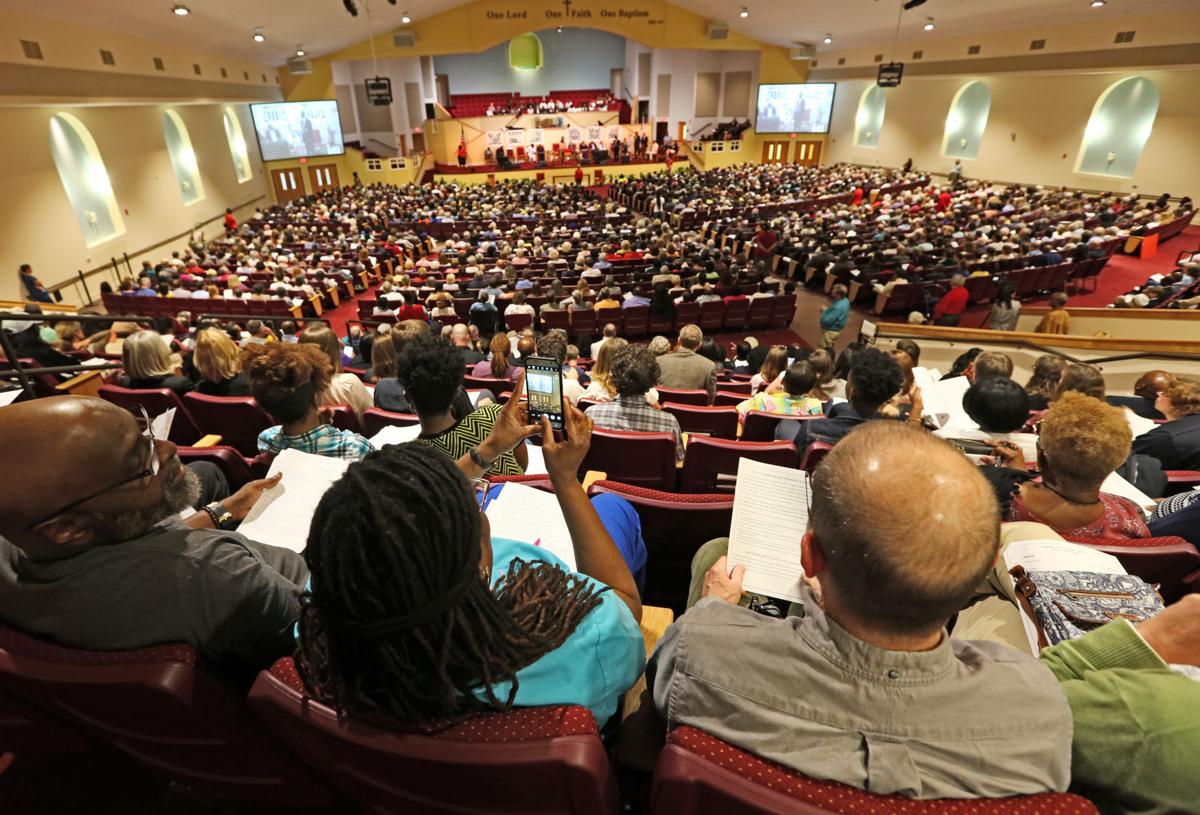April 30, 2018. The Post and Courier.
With housing prices in the Charleston area still hovering well above the national average, a coalition of local ministries has convinced elected officials in the Lowcountry’s largest cities and towns to team up and do something about it.
The Charleston Area Justice Ministry on Monday held its sixth annual Nehemiah Action Assembly, an event designed to challenge policymakers’ positions in front of thousands of ministry members. Past assemblies focusing on police practices and juvenile justice have been highly contentious, but the focus on affordable housing this year seemed to highlight a consensus among elected officials and the interfaith group.
All the council members in attendance from Mount Pleasant, North Charleston, the city of Charleston and Charleston County agreed to support CAJM’s nine-step plan to fund more affordable housing throughout the Charleston area.
They agreed that rapidly rising housing costs was a region-wide-crisis, and that it would take a major concerted effort by local leaders to help solve it.
County Council Chairman Vic Rawl and Charleston City Councilman Dudley Gregorie were hesitant to agree to serve on a regional housing board, but said they would help with the effort. They went a step further and suggested ways the faith organization could work with them to achieve the goals.
Gregorie cited a number of African-American churches such as Emanuel AME and Morris Brown AME that in the past had pooled resources to build and operate low-income rental housing.
“You guys have land, and you have resources, all of which can help us build affordable housing throughout the region,” he said.
Others in attendance included Charleston City Council members Carol Jackson, Keith Waring and James Lewis; Mount Pleasant Town Councilwoman Guang Ming Whitley and North Charleston City Councilman Mike A. Brown. None of the mayors were present.
The city of Charleston already has various programs to address the issue, which got a boost in November when City voters approved a $20 million bond to fund more affordable housing. Housing experts have said Mount Pleasant’s apartment moratorium would likely restrain its housing supply and drive up rent prices, but a special task force is now looking into strategies to add more reasonably-priced homes.
Regardless of individual efforts, the Justice Ministry argues that the problem is region-wide, and as such, will require a joint funding stream to create more affordable housing throughout the Lowcountry. Those were the conclusions of the Housing Needs Report, which was developed four years ago with officials from Mount Pleasant, North Charleston and the city of Charleston as well as Berkeley, Charleston and Dorchester counties.
“We are essentially saying, ‘We are holding you accountable for what you have already identified,'” said Ministry member LuAnn Rosenzweig.
The Ministry’s plan lays out nine specific steps each government should take to research the funding model, identify potential funding streams and convene a regional housing coalition.
When the Housing Needs report was published, half the region’s renters were living in housing they couldn’t afford, a much higher proportion than the national average. Since then, the costs to own or rent homes in the centrally located areas have only skyrocketed, even as new apartments have popped up to meet the demands of the growing region.
At the same time, the federal government’s housing funds have grown smaller every year, making housing assistance harder and harder for residents to come by.
The points were punctuated by a call-and-response catch phrase throughout the meeting. Moderators would ask the crowd, “What’s our call?” and a chorus of voices would respond, “Housing for all.”
Vermelle Meaders spoke to the crowd about her difficulty finding housing that she could afford even while working full time. She said she was on a waiting list for a Section 8 voucher in North Charleston for six years before she finally received one.
“We need decent, affordable housing that people can afford without having to work multiple jobs,” she said.
Cities across the country are grappling with the same issues — high housing costs that lead to workforce shortages — and a shrinking set of tools to address them. While experts say governments should also look at zoning codes that restrict housing densities, housing trust funds are seen as an effective strategy to strictly shore up more public and private dollars for housing.
In 2016, there were more than 770 city, county and state housing trust funds operating nationwide, with a combined $1 billion in funds made available in 2015 to support affordable homes, according to the Center for Community Change.
The reason they’re effective, advocates argue, is because initial money put into the funds can be matched by grants, private donations and low income housing tax credits.
Rosenzweig said she thought this year’s Nehemiah Action Assembly went smoothly because nobody could argue with the problem.
“Charleston has reached that tipping point,” she said. “Unless we do something really soon really fast, it’s just going to get worse.”
She said CAJM’s work on the issue has just begun, however. Now, members will attend council meetings and follow up on the promises elected officials made Monday.
View original article.






